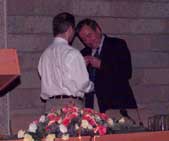|
|
|
|
THE SECOND MEETING of the INTERGOVERNMENTAL NEGOTIATING COMMITTEE ON PERSISTENT ORGANIC POLLUTANTS Nairobi,
Kenya |
 |
|
|
|
||||||||||||||||||||||||
|
The second session of the International Negotiating Committee (INC-2) for an International Legally Binding Instrument for Implementing International Action on Certain Persistent Organic Pollutants (POPs) was held from 25-29 January 1999 in Nairobi, Kenya. Delegates from over 100 countries, as well as representatives from UN agencies, environmental non-governmental organizations (NGOs), intergovernmental organizations (IGOs) and industry, convened to further consider possible elements of an international legally binding instrument on an initial list of twelve POPs grouped into three categories: 1) pesticides: aldrin, chlordane, DDT, dieldrin, endrin, heptachlor, mirex and toxaphene; 2) industrial chemicals: hexachlorobenzene and polychlorinated biphenyls (PCBs); and 3) unintended byproducts: dioxins and furans. Overall, many delegates characterized INC-2 as a success. Given the early stages of the negotiation process, this success can perhaps be attributed to preexisting global consensus on the hazards of POPs and the solid foundation from which negotiations began. (Continued in the Summary issue) |

|
|
from the Closing Plenary |
Special Interview
 |
In this exclusive interview Mr. Jack Weinberg of Greenpeace International, speaks with Laura Ivers of the ENB. Mr. Weinberg responded to and commented on the following questions:
|
For the complete selection of images and RealAudio please go to the day's page:
|
|
© Earth Negotiations Bulletin, 1999. All rights reserved.





